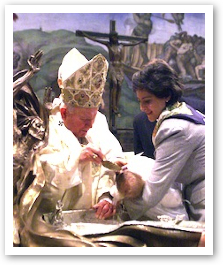6 Recommendations for Improving Our Catholic Schools
- VANCOUVER SYNOD STUDY COMMISSION ON TEACHING THE FAITH
 |
1) Affirm the central role of sacred liturgy in the teaching ministry of the Church
No Christian community is built up which does not grow from and hinge on the celebration of the most Holy Eucharist. From this all education for community spirit must begin. (Vatican II, The Ministry and Life of Priests, 6.)
The central role of liturgy in the teaching ministry of the Church has long been recognized. A clear understanding of the content and high meaning of the Church's liturgy is therefore a fundamental goal of all catechetical programs. If, through our catechesis, we are successful in engendering those dispositions of reverence, wonder, and contemplation necessary to be most edified and transformed in the light of liturgy, we will have opened the vast storehouse of the Church's treasury to the souls of our Catholics in formation.
The Mass, being the very core of Catholic liturgy, is the supreme expression of the Church's faith. While proper liturgical expression and practice inevitably build up the faith, a concept of the Mass that fails to do justice to its essence will in due time harm the piety of believers, undermine the faith of communicants, and destroy the unity of the Church.
To enter more fully into the rich meaning of the liturgical life of the Church and thereby maximize the teaching role of the liturgy it is recommended that we:
Action items:
- Make liturgical formation a high priority, educating our entire Christian community but most especially those responsible for liturgical practice and catechesis in the mysteries, meaning, and appropriate forms of Catholic liturgy, in order that the faithful might "[enter] more deeply into the contemplative dimension of worship, which includes a sense of awe, reverence and adoration which are fundamental attitudes in our relationship with God." (Pope John Paul II, ad limina discourse, Oct 9, 1998.)
- Teach our students, our catechumens, the deep meaning and sacred significance of the form and substance of the Holy Mass, reinforcing the understanding of the Mass as a sacrificial meal that both commemorates and offers salvation. Students should be led to appreciate the Mass as prayer "the source and summit of the Christian life" and instructed in how to approach the Mass with reverence. Jesus remains with us under the sacred sign of the Eucharist which is why Catholics have always been encouraged in devotion to the Blessed Sacrament. Eucharistic adoration should be a regular part of Catholic religious educational practice.
- Teach our students the history of the tradition of sacred liturgy, and the great art and especially the great music the liturgy has inspired. Some knowledge and practice with Gregorian Chant, as the Church's own music, should be part of this training.
Re-emphasize, and in some cases restore in our schools, the time-honored traditional liturgical celebrations such as: weekly school Mass, Benediction, Adoration, Marian devotions, and a general recognition and celebration of the feasts and seasons of the liturgical year. Such celebrations should be simple though never trivial beautiful, inspiring, and consistent with the traditions of the Church.
 This is Meaghen Gonzalez, Editor of CERC. I hope you appreciated this piece. We curate these articles especially for believers like you.
This is Meaghen Gonzalez, Editor of CERC. I hope you appreciated this piece. We curate these articles especially for believers like you.
Please show your appreciation by making a $3 donation. CERC is entirely reader supported.

Acknowledgement
These recommendations are taken from the "Synod Study Paper on Teaching the Faith", prepared for the Vancouver Archdiocesan Synod in Vancouver, B.C., Canada. This document was the working paper and formed the basis for one of the final documents of the Synod, "Teaching the Faith".
Next: The Beauty of Holiness and the Holiness of Beauty




